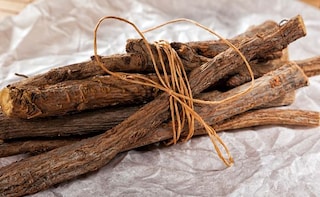Some spices and herbs from our grandmothers' trove are so precious that till date they continue to be used in everyday home remedies. One such age-old herb that has been used for its exceptional health promoting properties is mulethi or liquorice, also spelt as licorice. A perennial herb that is found in various parts of Asia and Europe, mulethi has been used for centuries, especially in Ayurveda. Apart from medicines, it is widely used as a flavouring agent due to the natural sweetness the extract has.According to the book Healing Foods by DK Publishing, its anti-diabetic and anti-oxidant properties aid the treatment of metabolic syndrome. It supports liver health and is an antiseptic that helps to calm the stomach. It is also an expectorant and decongestant that can help fight respiratory infections. There is some evidence that liquorice in small amounts can be used to decrease sugar cravings. Moreover, it is also known to be beneficial in cases of low blood pressure.
2. Boosts immunityRegular use of mulethi is known to boost immunity, thanks to the enzymes present in the root plant; it helps the body produce lymphocytes and macrophages that protect the body from microbes, pollutants, allergens and cells that cause autoimmune diseases, further keeping you away from infections and allergies and in turn boosting your immunity.3. Boosts digestion
4. Cures skin ailmentsMulethi is an emollient that helps maintain a healthy glowing skin. All you need to do is to add mulethi powder to rose water or milk depending on the type of your skin. This will help combat de-pigmentation and further soothe skin rashes.5. Has anti-inflammatory propertiesLiquorice has anti-inflammatory properties that may be able to treat chronic inflammatory diseases like arthritis. Its anti-oxidant properties also reduce the effects of free radicals causing pain and inflammation in the body.
6. Eases menopausal symptomsThe phytoestrogenic compounds in this herb help correct hormonal imbalance in the body to ease menopausal symptoms like hot flashes, insomnia, depression, mood swings, sweating, et al. A study published in the Iranian Journal of Pharmaceutical Research highlights its positive effect on menopausal hot flashes.How can you use mulethi (liquorice)?All you need to do is to boil the root to make a tea if you are feeling nauseous or are coming down with a cold. Liquorice tea is also good for maintaining dental health; try gargling with the cooled tea.So go ahead and get your stock of mulethi ready for the cold days ahead and stay healthy.
Here are some of the important benefits mulethi or liquorice has to offer, especially in winter.
1. Keeps the respiratory tract healthyAdvertisement
Advertisement
Advertisement
For the latest food news, health tips and recipes, like us on Facebook or follow us on Twitter and YouTube.
Advertisement
